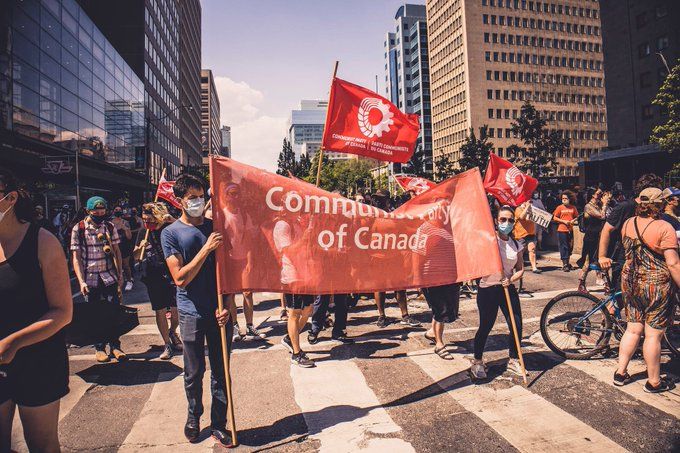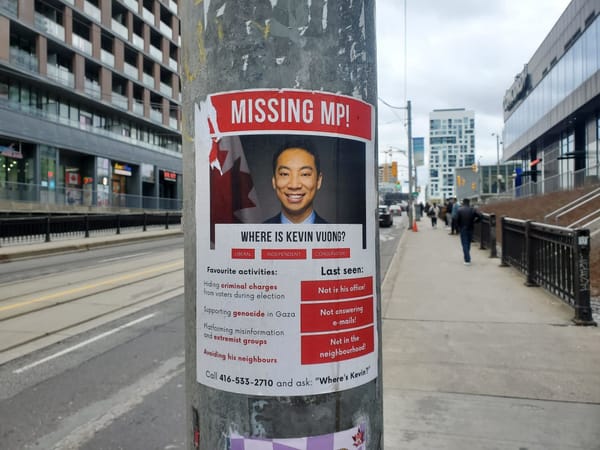The first thing you need to know about the Communist Party of Canada (CPC) is they have no illusions about winning — this is not a party planning to form government. Instead, the party makes a compelling case for running in elections for its own sake, and the importance of putting your ideas in front of people to show there are alternatives to the mainstream parties, and perhaps a better world, just waiting to be found.
The party’s platform calls to: eliminate income tax for people earning less than $40,000 and raise wealth taxes; build 1 million public housing units; rebuild publicly owned utilities; implement universal pharmacare; abolish the RCMP; settle Indigenous land claims; implement pay equity legislation; replace the Temporary Foreign Worker Program with a path to citizenship; end arms sales to Saudi Arabia; cancel the debts of impoverished countries; and so on.
There are things in it to disagree with, things to find intriguing and things that are perhaps too utopian to ever see the light of day in our lifetimes. But more than anything else, it shows what a narrow band Canadian politics offers the public, and how our system of government, the way we elect our representatives, and the status quo bias of the media prevent truly radical ideas from ever cracking into the public consciousness.
Take, for example, this platform promise: “Adopt a People’s Energy Plan, including public ownership and democratic control of all energy and natural resources, including extraction, production and distribution.” Nationalizing major industries is off the table for other parties. They would never even think to suggest doing it at all, never mind a wholesale nationalization of the energy and mining sector.
Public ownership has only been slightly broached by the NDP, who have promised to nationalize certain for-profit long-term care homes. It’s a step, surely, but given the horrific death tolls during the pandemic in these homes, it’s far too small of one. And it’s here you see the value of reading the platform of a small party with extremely modest hopes of being elected in any seats.
The NDP often talk about how their best ideas are stolen by the Liberals. It’s even part of their current pitch to voters. But for the CPC, having other parties take up their policies is only a starting point. As Kimball Cariou, a long-time member of the CPC, argued in Passage: “Many of the social and political policies broadly supported in Canada were first advocated by the Communist Party. Yet we also consciously link today’s struggles for progressive reform with the goal of a socialist society.”
Cariou added, “We openly call for public ownership, global disarmament, solidarity with Palestine, an end to the pernicious ‘right to protect’ doctrine and a wide range of other radical and anti-imperialist demands.”
It’s that radicalism, that willingness to move past what is broadly acceptable, that sets the platform apart. It’s about moving beyond tangible promises and toward the ephemeral.
The platform isn’t costed, it doesn’t try to attach dollar amounts to individual promises and it doesn’t get bogged down in the details of how to implement them. The platform’s preamble makes clear this isn’t a rough draft for a budget or anything like that — this is a stack of policies a few Communist MPs would push a government to adopt. They’re looking to get their polices and wholesale social change on the agenda, not design a tax credit for 34 to 46 year olds born under a harvest moon.
“The best outcome in this election would be a minority government and a strong progressive bloc including Communists, with strong ties to the labour and people’s movements. A progressive bloc would fight for a People’s Recovery and win important victories for working people,” the platform says.
Some of what is proposed would fall under the purview of the provinces. But here too, the party is looking to break the mould of what mainstream parties offer.
Constitutions can be changed. Just because Prime Minister Brian Mulroney failed in his attempts to make changes to the constitution in the ’80s and ’90s doesn’t mean it’s impossible, despite how calcified conventional wisdom has come to believe so. It absolutely could, but someone would have to try.
One of party leader Jack Layton’s last acts in the NDP was to begin the process that would eventually result in an amendment to the party’s constitution that removed the word “socialism” from its preamble. It was an attempt to make the party more electable, more mainstream. After Layton’s death, the motion passed a vote under Thomas Mulcair, who took the philosophy of NDP moderation to spectacular defeat.
It was the end point of the party’s long march away from socialism and into mainstream acceptability, making it clear the NDP was operating under the same consensus as all the other parties, just with a slightly different ratio of taxing and spending.
This is why the CPC platform is important: It widens the imagination to what politics could be. More than anything, it’s an aspirational document. And so little in our politics asks us to aspire to anything at all. For that alone, it’s worth its weight in pixels.







Member discussion